Children as young as four taking knives into school, BBC finds
Ruth GreenBBC News,
Fiona TrottBBC News and
Gerry GeorgievaBBC News
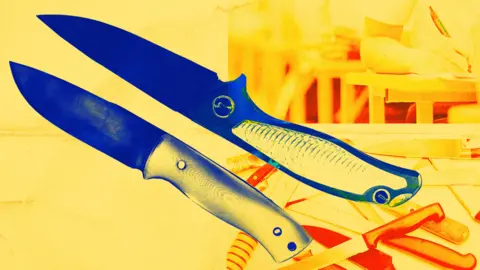 BBC
BBCIncidents of very young children taking knives into primary schools have been revealed by a BBC investigation.
Police in Kent recorded an assault involving a four-year-old pupil, while officers in the West Midlands reported that a six-year-old had taken a flick knife into class.
The mother of Harvey Willgoose, a teenager murdered by another pupil in Sheffield, says the data is shocking and is calling on the government to fund metal detectors, or “knife arches”, for all UK schools and colleges.
One teenage boy from Sheffield, who says he has taken knives to school, told us: “I just felt like I need to protect myself.”
There were 1,304 offences involving knives or sharp objects in 2024 at schools and sixth form colleges in England and Wales, a Freedom of Information request by the BBC has found.
At least 10% were committed by primary-school-aged children, police data suggests.
One educational trust in the West Midlands told us it was installing permanent metal-detecting “knife arches” in all four of its secondary schools because the rate of knife crime in its police force area was so high.
Nearly every force – 41 out of 43 across England and Wales – responded to our request for information about knife incidents in schools.
Two thirds of them also gave us data on the ages and genders of children involved – and those figures revealed that almost 80% of offences were carried out by boys, the vast majority teenagers.
We were also given details of incidents involving primary-age children, some of them very young:
- Kent Police responded to a four-year-old with a knife at a school. The offence was recorded was “assault with injury – malicious wounding”. The child was under the age of criminal responsibility, so another body or agency intervened
- West Midlands Police reported that a six-year-old was in possession of a flick knife. The child told staff that “I have a plan… I am going to kill [name of pupil]”. Staff seized the knife after the child initially denied having the blade on him
- West Midlands Police also logged that a five-year-old had taken a 10-inch kitchen knife into school to “show his friends” and a six-year-old had gone to school with a “meat cleaver”
- Cheshire Police reported that it had gone to a school in Chester where a five-year-old boy had taken in a kitchen knife
Reporting of such young offenders, however, is not always consistent across schools and police forces, as the age of criminal responsibility is 10.
In response to the BBC’s findings, the government told us it has a “mission to halve knife crime” and “schools have the power to implement security measures, including knife arches, where necessary”.
Mother Caroline Willgoose says “kids are going to school frightened” and the installation of knife arches could be a deterrent to crime.
Her son, Harvey, was murdered by a fellow pupil with a hunting knife in February at All Saints Catholic High School in Sheffield. The 15-year-old was stabbed twice in the chest.
Caroline says Harvey was afraid to go to school because he knew some children were carrying knives.
 Handout
Handout“I always thought knives was a gang-culture type of thing. Never in a million years would I have thought there were knives inside school,” she says.
The 51-year-old says many of the pupils and teaching staff who saw what happened are still receiving trauma counselling.
“It’s been horrific. I can’t describe the pain… we need to get into schools and educate kids of the seriousness and the pure devastation that carrying knives can bring.”
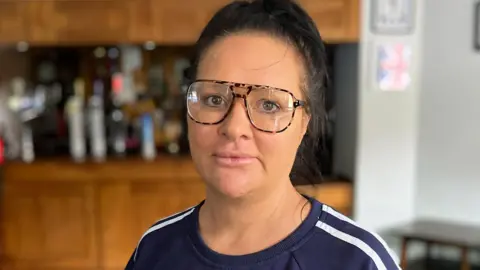
The police forces were all asked by the BBC about offences with bladed weapons they had recorded on school premises in the past few years.
The types of knives found included machetes, pen knives, flick knives, butterfly knives and swords.
Although the 2024 figure for the total number of knife incidents (1,304) is slightly down on the previous year, according to the data we received, the number of more serious offences recorded – for example violence rather than possession – has gone up.
Some schools have responded to rising knife crime by adding security measures to check for bladed weapons.
Beacon Hill Academy in Dudley has recently installed a new knife arch – the BBC was able to see it in use for the first time.
Evie, who’s 16, says the arch is a stark reminder of possible dangers: “You think about what it’s there for and what children do bring to school, and you never know.”
Thirteen-year-old Archie agrees but says “you’ve got to keep in mind it was put in for a safety thing. So, it’s kind of scary on the one hand, but at the same time reassuring”.
Headteacher Sukhjot Dhami says the school needed to add extra security – “whatever it takes to keep young people safe”.
The three other secondaries run by Dudley Academies Trust are introducing similar security measures – a response, says the trust, to the high knife-crime rate in the West Midlands Police area.
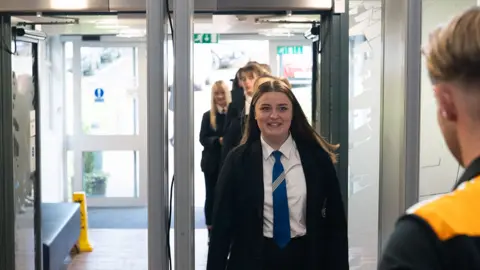
The boss of one the UK’s largest providers of metal detectors says sales to schools of knife arches and handheld wands have risen.
Schools are our biggest customers, says Byron Logue, managing director of Interconnective Security Products.
The company sold 35 knife arches to schools between March 2024 and March 2025 – a threefold increase previous 12-month period before, he says. In the last 12 months they have also sold more than 100 knife wands to schools.
“I think we’ve reached a stage now where we can acknowledge that there is a problem nationally in the country with regards to knife crime, particularly amongst the youth,” says the businessman.
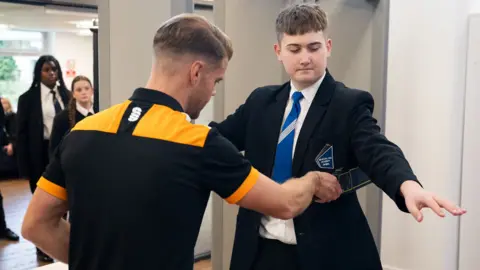
In a Sheffield gym, we meet three teenagers who tell us they have taken knives into school.
One boy, 15, tells us he used to take a 12-inch knife into the classroom.
“The first time I took a knife in, was when a kid sent out a message saying, ‘I’m going to kill you this time’. So I asked one of my friends to give me a knife and I paid about £30 for it.”
The teachers didn’t notice, he says. “I used to always walk in with a blade on my hip. I’d sit down normally so the knife wasn’t moving around.”
Another boy, 18, says he started carrying a knife into school after being attacked and slashed on the hand by another pupil.
“I just felt like I need to protect myself,” he explains.
We challenge the teenagers about why they broke the law and took knives into school.
One of them replied: “You just got to take your precautions. Nowhere’s safe really.”
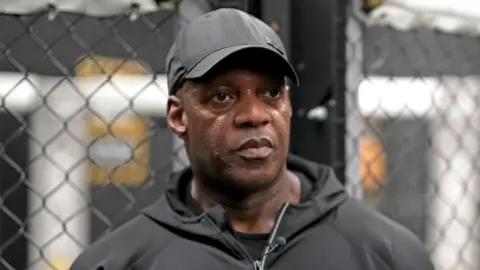
The three boys are in the gym as part of an effort – by owner Trevor Chrouch – to offer young people an alternative to crime. A former professional bodybuilder, these days Trevor offers mentoring and teaches young people self-defence. He lets secondary school pupils use the gym for free, he says.
“I think kids are bringing knives into school every day. Just like their mobile phone in their pocket, they’ve got their knife in the other pocket. It’s because they’re scared.”
We asked the Home Office to read our research.
It said it was addressing the root causes of knife crime through its Young Futures programme and that schools had the power to implement their own security measures including knife arches.
It will also implement “stricter rules for online sellers of knives”, it says, by backing “Ronan’s Law” which came into effect in August.
The Association of Schools and College Leaders says while it is relatively rare for pupils to bring knives into schools, it would like to see greater efforts across society to tackle the issue.
“More than a decade of cuts to community policing and youth outreach programmes has meant school leaders, too often, find themselves with little or no support,” says general secretary, Pepe Di’lasio.
Back in Sheffield, we asked the teenagers in the gym what would have stopped them from taking knives to school.
“Learning how to defend ourselves,” the 19-year-old told us. “You don’t get taught that in schools. They only teach you science, not how to live life and how to handle your emotions better.”
Share this content:
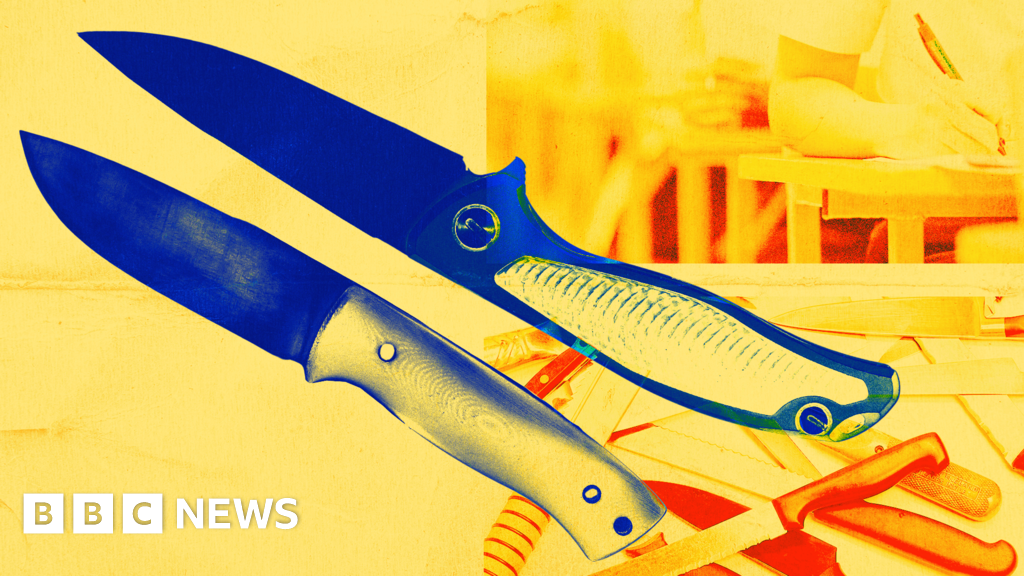



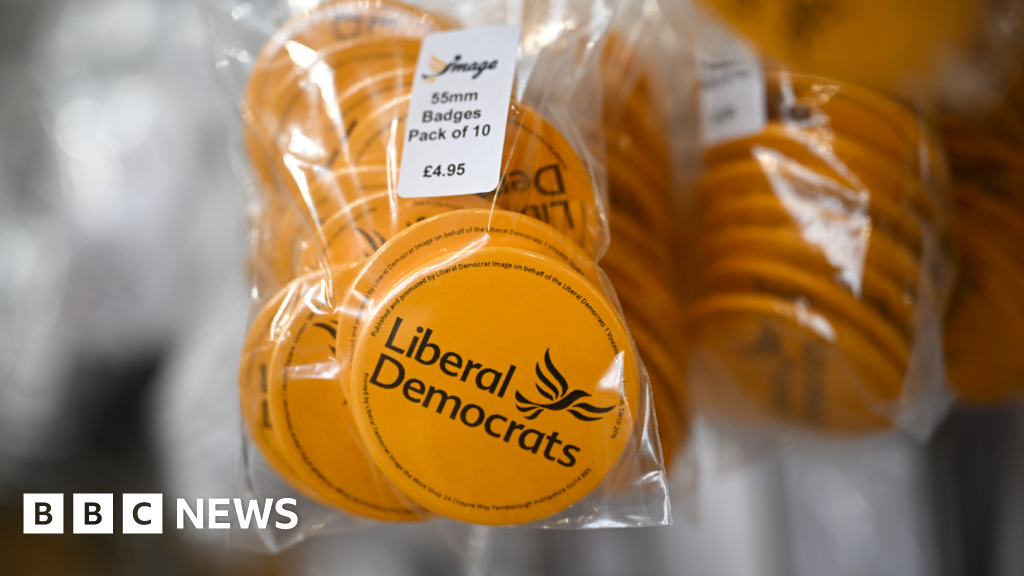
إرسال التعليق